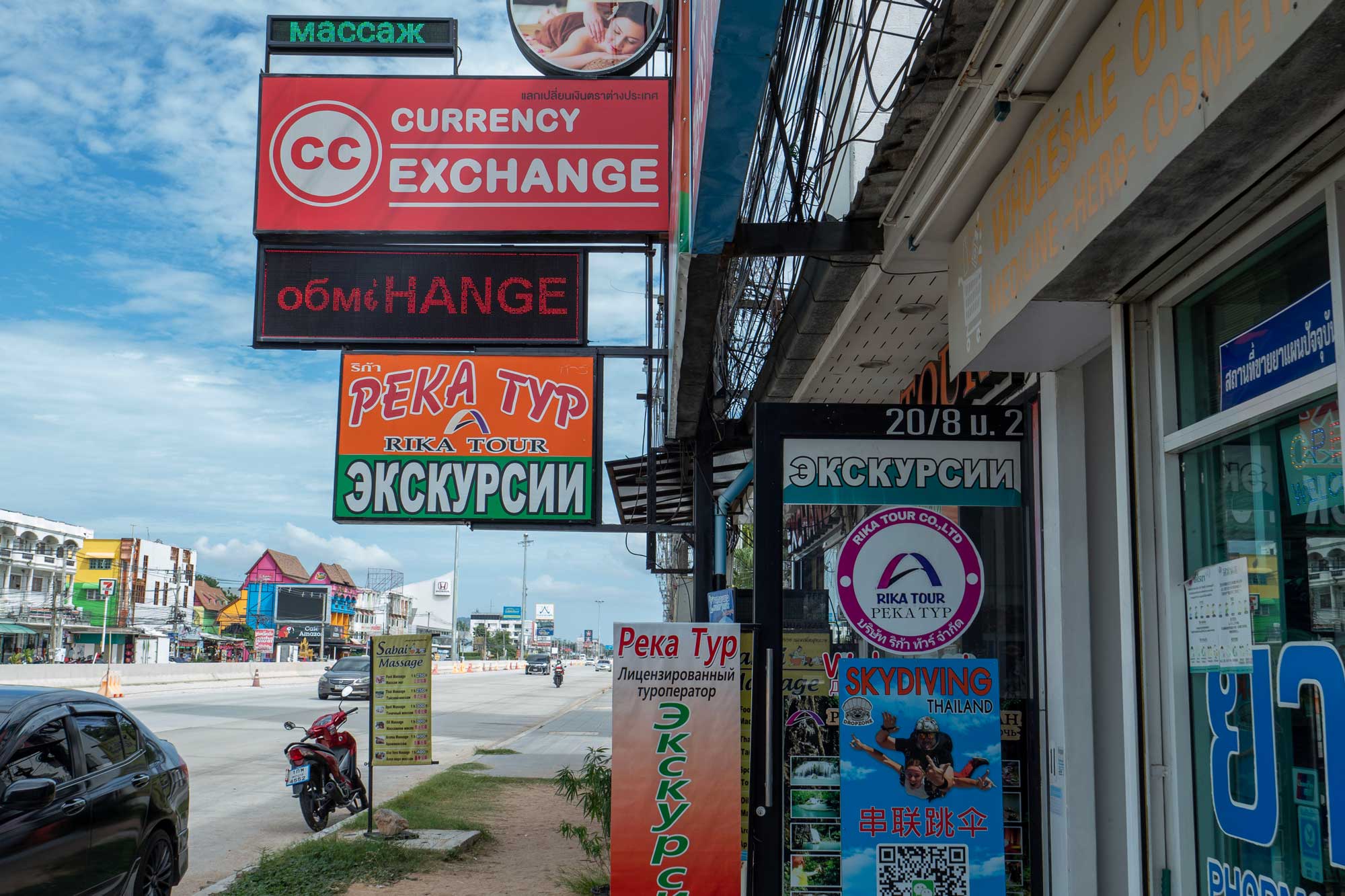
Tourist rubles ensure warm welcome
for Russians in Thailand
Russian visitors are rising in the Land of Smiles, but Moscow struggles to forge strategic ties and weapon sales to the Thai military.
By Luna Pham for RFA
Dec. 4, 2023
Ask any Russian person which country in Southeast Asia they have heard about and you’d probably hear “Thailand.” Russian tourists are crowding its beaches, bars and even its Orthodox churches.
That’s not just a sign of Thailand’s legendary reputation for hospitality and knack for catering to foreign visitors that has earned the country the moniker “Land of Smiles.” Thailand welcomed 11.4 million foreign tourists in 2022. But with Russians increasingly limited on where they can visit because of international restrictions imposed on Moscow relating to the war in Ukraine, Thailand has kept its doors open.
From Russia with love
On the southern island of Phuket, some areas have turned into something resembling a resort town on the Black Sea with Russian men and women lounging on the beach, trying to soak up as much sun as possible.
There are signboards in Cyrillic, Russian mothers pushing strollers around and new Russian restaurants that offer a taste of home. Russian real estate agents, tour companies and even Russian tour guides cater to the visitors – which rankles locals in the tourist trade, who say they are losing business.
“Russian people love Thailand, the people, the climate, the nature and the delicious food,” gushed Olesya, a young Russian businesswoman. She and her husband, Denis, have been to Phuket five times.

Olesya said they felt welcome here and “have not sensed any negative vibes” against Russians – although they were shy of speaking to a journalist and requested to be identified by their first names only.
Thailand is America’s oldest ally in Asia, and was for decades a bulwark against Soviet influence in Southeast Asia during the Cold War, but it’s also a nation with a storied past with Russia.
Diplomatic relations date back 126 years, when the then-Kingdom of Siam’s modernizing monarch, Chulalongkorn, also known as King Rama V, traveled to St. Petersburg in 1897.
Despite the international maelstrom over Russia’s invasion of Ukraine, Thailand has not condemned Moscow and has abstained from several votes against Russia at the United Nations.
But perhaps more significantly, there are still ways for Russians to spend their money in Thailand, which relies heavily on tourism earnings.
Due to U.S. and U.K. sanctions, Russians can’t conduct transactions via the global SWIFT electronic payment system. But they can still use China’s UnionPay – the world’s largest card payment network – or use cash or cryptocurrencies.
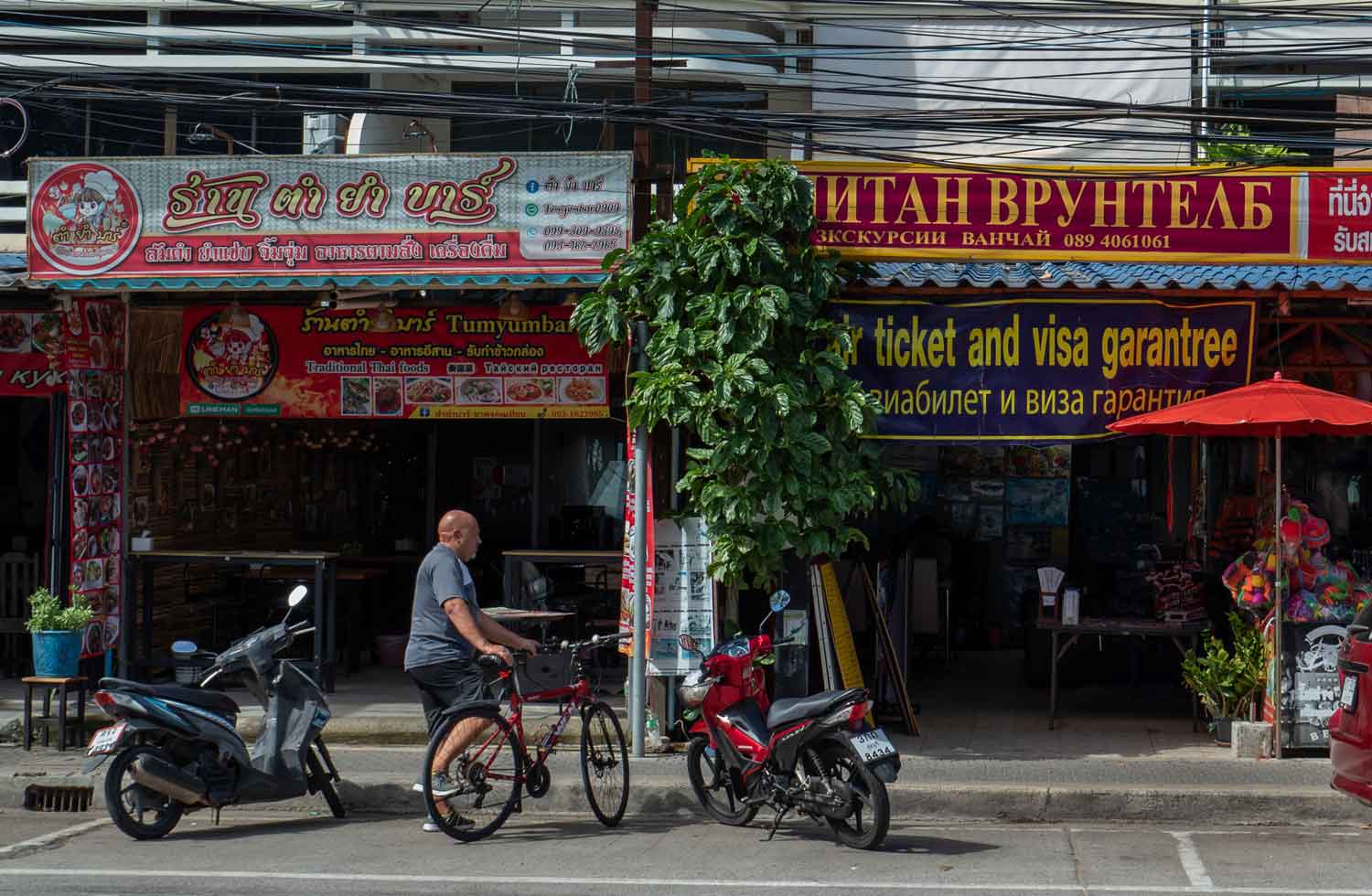
Cornering the condo market
The Thai Tourism and Sports Ministry said that between January and June this year nearly 800,000 Russian nationals visited the Kingdom, and the number is expected to reach more than 1 million by the end of the year. The Tourism Authority of Thailand has set an ambitious target of receiving 2 million Russian visitors in 2024. Half of them are expected to fly to Phuket.
A free 45-day visitor visa and direct flights between the two countries make the goal easier. Maetapong “Oun” Upatising, president of the Phuket Real Estate Association, says that the Russian market bounced back quickly after the COVID downturn, both in tourist numbers and property demands.
Russian visitors prefer to rent villas and condominiums instead of hotels when staying longer than three months, and the number of rental units in Phuket alone is more than ten thousand a month, he said.
There is also a growing number of rich Russians who obtained long-term resident visas that let them stay in Thailand for five to 10 years or more. Those so-called “elite visas” cost at least U.S.$20,000 yet the number of elite visa holders from Russia is increasing steadily.
Between 5,000 and 10,000 Russians are thought to have obtained long-term visas and become residents in Phuket. Last year Russian buyers purchased nearly 40% of all condominiums sold to foreigners on the island, according to the Thai Real Estate Information Center.
Russian investors also put large sums of money into other types of properties, among which luxury villas are the top buy. Those villas come with hefty price tags, starting from 25 million baht ($730,000), according to Maetapong from the Phuket Real Estate Association.
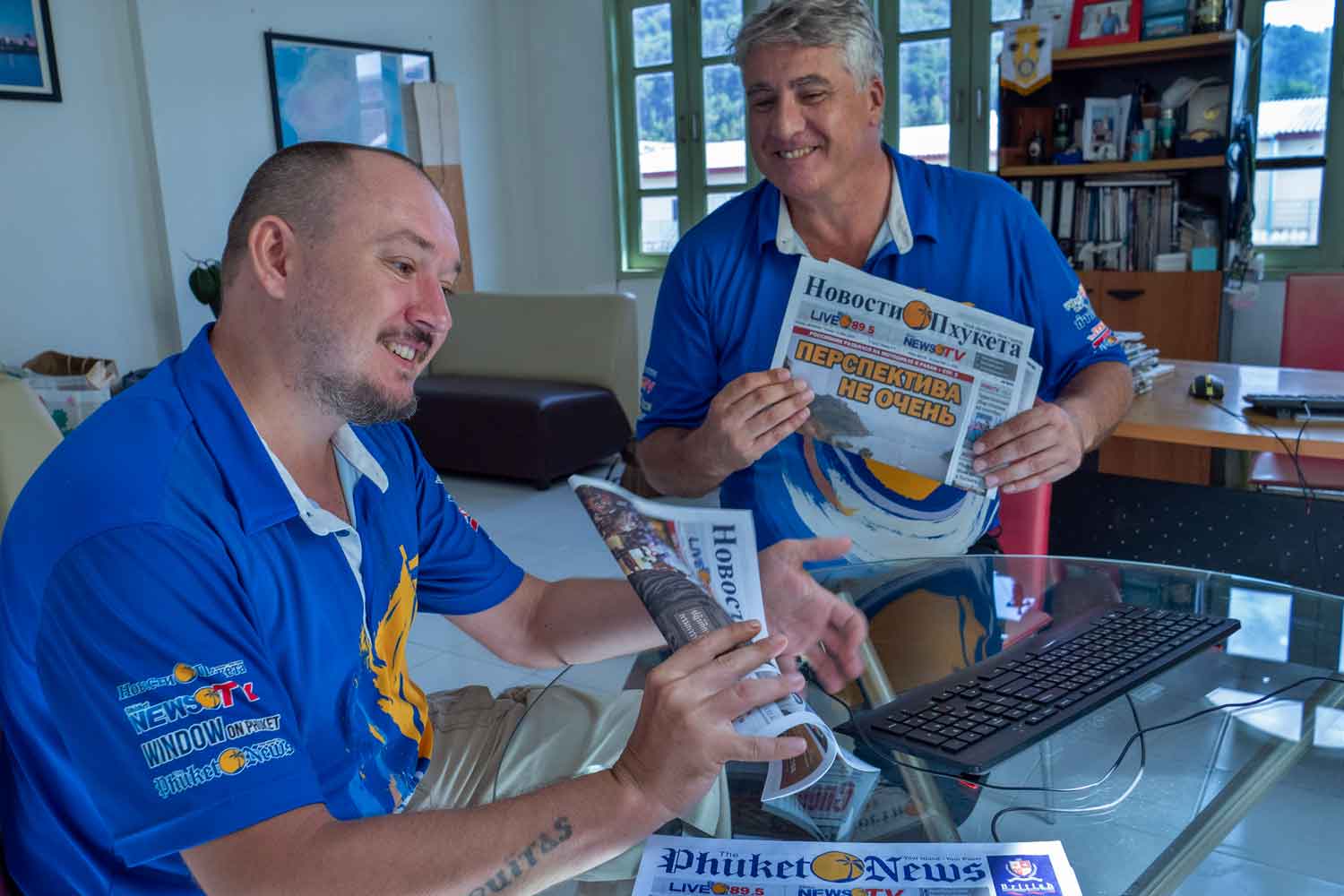
Organized crime
Phuket even has its own Russian newspaper. Despite the comparative ease with which Russians can travel to Thailand, the paper’s editor gripes that his countrymen get a bad rap.
“Right now, it’s legitimate not to like the Russians,” said Anton Makhrov, the editor of Novosti Phuketa, who likens it to a kind of xenophobia against Russians in Thailand.
“When you get on Facebook, you’ll see lots of comments such as ‘the Russians are aggressive and arrogant, we don’t like you’ but when you talk to people they all say they have good relations with some Russian friends,” he said, speaking in the weekly paper’s office in a small alley in Kathu district of Phuket.
Russian visitors have also often been blamed for bad behavior, as well as petty crime such as drunk-driving and theft.
The invasion of Ukraine in 2022 also appears to have dimmed Thais’ perception of Russian people. Katherine Aliakseyeva, principal of the Russian Dance Academy "Katyusha" in Bangkok, says she’s worried about the safety of her staff and students. The school has been regularly taking part in cultural events organized by the Russian Embassy.
There are also long-held suspicions that Russian “mafia” operate in Thailand. A December 2009 cable by the U.S. Embassy in Bangkok that was declassified in 2019 said that “Russian organized crime circles established a presence in Thailand in the 1990s after the collapse of the Soviet Union.”
According to the diplomatic cable, U.S. and Thai law enforcement agencies reported that “criminal networks composed of mostly Russian nationals operating in Pattaya and Phuket are responsible for the commission of numerous crimes, including extortion, money laundering, narcotics trafficking, real estate fraud, financial fraud, human smuggling, pandering, counterfeiting, document fraud, cybercrime and illegal importation of cars.”
“A number of U.S. law enforcement agencies are involved in investigating or monitoring cases involving Russian organized crime in Thailand in cooperation with Thai partners,” it said.
However, earlier this year Thai police officials were also quoted by domestic media as saying that “no Russian organized crime rings have been detected amid the recent influx of visitors.”
Police Maj. Gen. Phanthana Nutchanart, deputy commander of the Immigration Bureau, told the Bangkok Post that “most legal issues involving Russian citizens in Thailand were minor offenses, such as traffic violations.”
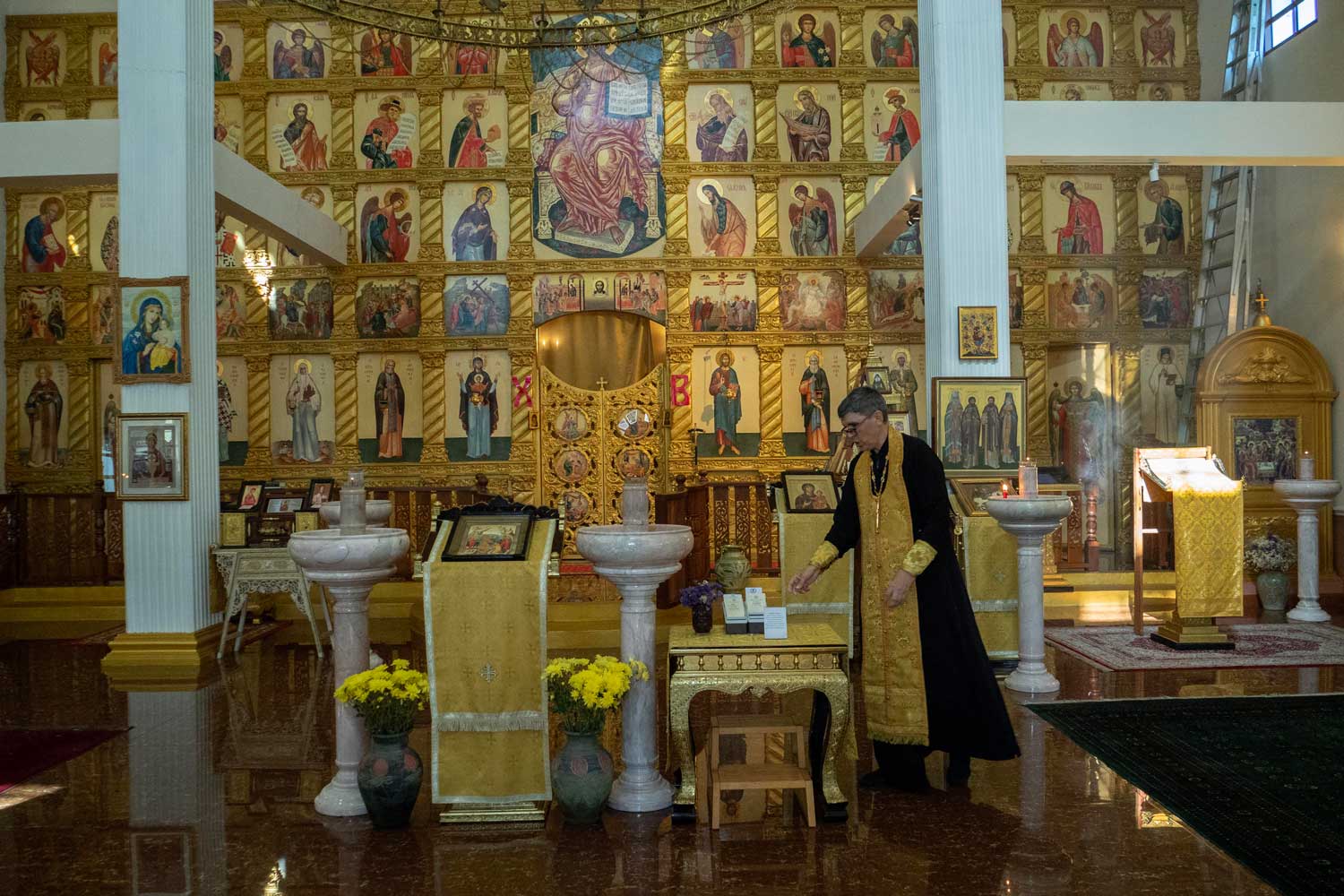
‘Everything else is God’s will’
There is a spiritual side to Russia’s presence in Thailand.
As the number of Russian visitors has grown, so has the demand for places to worship.
Today there are 10 Russian churches in Thailand. The first parish – the Nicholas parish, named after Russia’s Tsar Nicholas II – was opened in Bangkok in 1999.
In 2007, Thailand’s Queen Sirikit visited Russia to commemorate the 110th anniversary of diplomatic relations, and a year later, the Russian Orthodox Church was officially recognized by the Thai government.
The churches mainly serve the Russian-speaking community that is made up of tourists and locally-based businessmen, but it draws some Thais too.
Several priests from Thailand, as well as from Laos and Cambodia – all predominantly Budddhist countries – have attended Russian Orthodox seminaries and are now serving in Southeast Asia.
The war in Ukraine has created serious tensions within the Orthodox Church. The head of the Russian Church – Patriarch Kirill – has openly thrown his support behind President Vladimir Putin, but Patriarch Bartholomew, the head of the world's Orthodox Christians, has condemned the Russian invasion.
Bartholomew in December 2018 granted independence to the Ukrainian Orthodox Church and more than 100 Ukrainian churches have now distanced themselves from Moscow.
In Thailand, both believers and priests alike also try to distance themselves from the conflict. Danai Wanna, who was the first Thai national ordained as a Russian Orthodox priest and is now serving in the resort city of Pattaya, said that priests are not allowed to speak about the war.
The Church of All Saints nestles in a village on the outskirts of Pattaya. It boasts a large collection of Russian icons, which Danai is very proud of, even if most of them are replicas.
Services are conducted in a small hall on the second floor, and the priest said during the high season and on Christian holidays he receives hundreds of worshippers.
“Many different nationals come here to pray and we don’t talk about anything but friendship and love,” he said.
“We don’t discuss about what’s been happening but we pray for peace. Everything else is God’s will.”
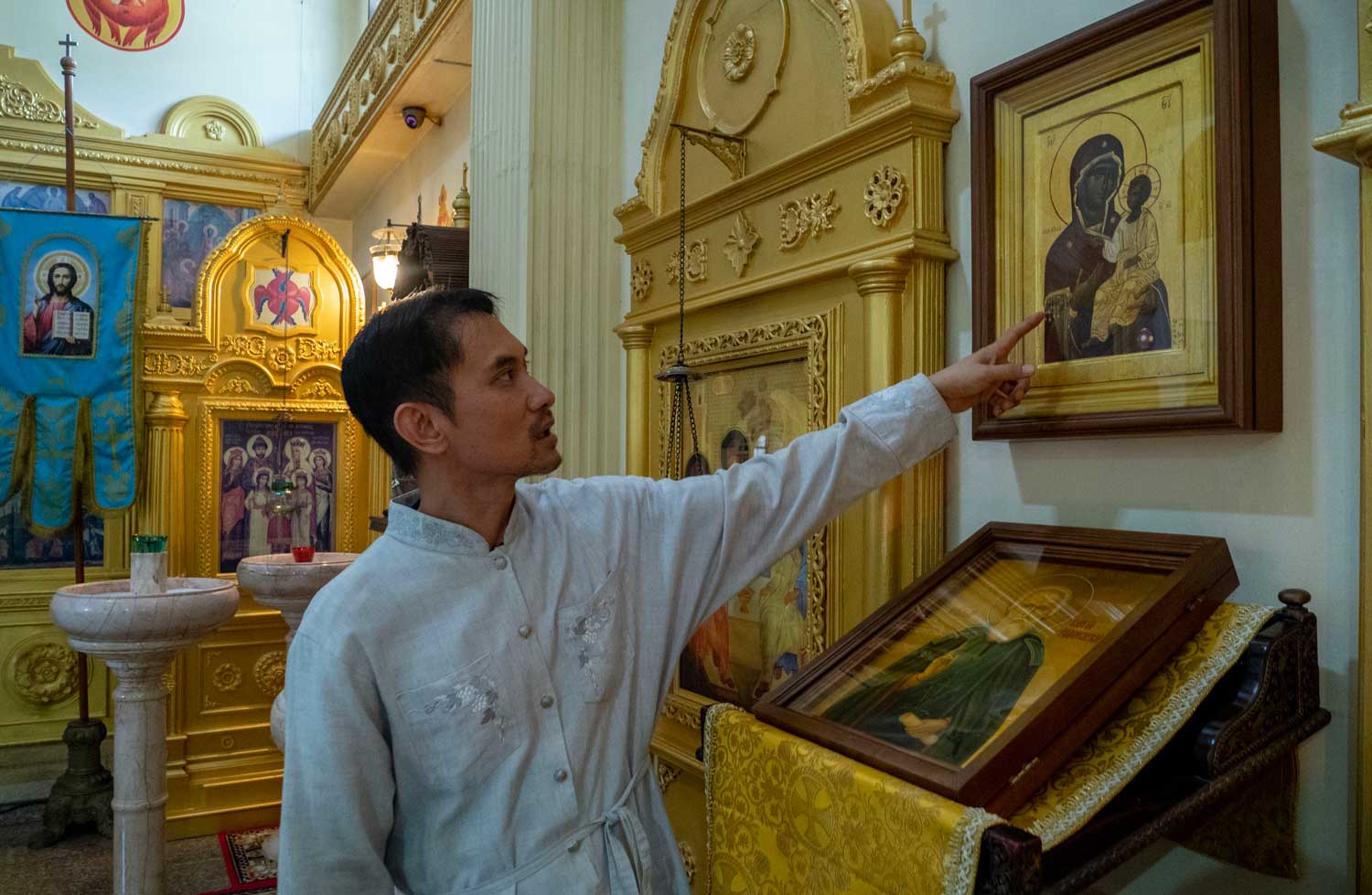
Diplomatic pressure
Thailand’s refusal to yield to pressure from Western countries to condemn Russia has raised some eyebrows in Washington. A close U.S. ally, Thailand was once known as fiercely anti-communist.
However, “in the post-Cold War era and especially since the turn of the twenty-first century, Thailand’s role in international affairs has become much less proactive,” according to Ian Storey, a senior fellow at ISEAS – Yusof Ishak Institute in Singapore.
The relationship between Bangkok and Washington also eroded after the military coups in 2006 and 2014 in Thailand, which the U.S. condemned.
“In the country’s relations with the major powers, successive Thai governments have tried to pursue a balanced approach and not to take sides in the geopolitical squabbles,” Storey said.
In March 2022, a month after the invasion of Ukraine, then-Prime Minister Prayuth Chan-o-cha told a cabinet meeting that “Thailand must maintain a neutral stance” and that “the long-standing relations between Thailand and Russia must be taken into account.”
That year, the two countries celebrated the 125th anniversary of diplomatic relations.
In fact, the first contacts between the monarchs of Russia and Siam go back as far as the 1860s when two Russian Imperial Navy Pacific Squadron ships anchored in Chao Phraya River and the sailors were granted an audience with Mongkut, King Rama IV.
In 1891, King Rama V received Crown Prince Nicholas on his visit to Siam. Rama V’s son, Prince Chula Chakrabongse, studied and graduated from the Russian Imperial Military Academy and married a Russian woman.
In 2003, Putin became the first Russian leader to visit Thailand for more than 100 years.
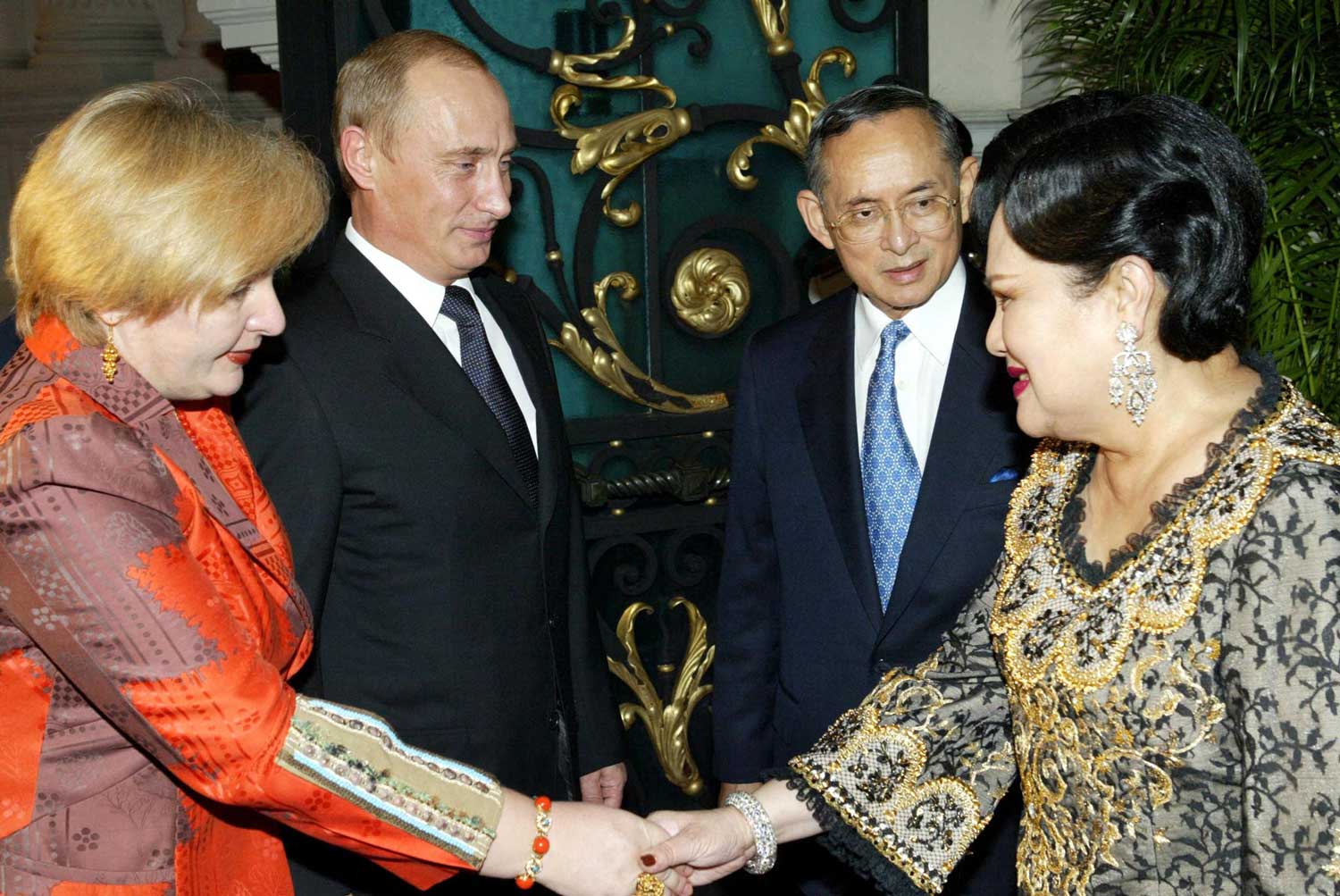
Arms sales and military cooperation
The recent warming in Russia-Thailand relations appears to stem primarily from pragmatic calculations. While trade between the two countries is modest at $1.81 billion in 2021, the Thai economy relies greatly on tourist income.
Thai tourism authorities say Russian visitors are among those who stay the longest and spend the most.
Yet, following the 2014 Thai military coup that complicated the U.S.-Thailand alliance, Russia saw an opportunity to boost defense relations with Thailand, and together with it, arms sales.
Then-Prime Minister Prayuth, who had led the coup, traveled to Russia in May 2016. The two nations signed an agreement on military cooperation. A year later, they signed a military-technology collaboration agreement.
Thailand had expressed interest in buying Russian military equipment such as helicopters, fighter jets and tanks for its air force and ground troops.
However, Storey from the ISEAS-Yusof Ishak Institute said that so far Moscow has had little success in arms sales. Its defense exports to Thailand over the period 2006-2021 have amounted to just $73 million, he said, adding that Moscow has been “undercut by China on price.”
Two examples were when the Thai military junta invited bids for the supply of two submarines, as well as a new main battle tank, and both times awarded the contracts to China, which has now become Thailand’s leading supplier of military equipment.
“Russia is simply not a player in Thailand's defense plans though they flirted heavily for years,” said Storey.
But the push continues. Since 2021, Thai cadets and officers have been sent to Russia to undergo training at the military academy under the Russian Federation's Ministry of Defense. Courses vary from one to six years, according to the Russian Embassy.
And at a ceremony at U-tapao Air Base near Bangkok in March 2021, Russia handed over three Mil Mi-17V-5 transport helicopters to the Royal Thai Army. Moscow delivered 10 such helicopters between 2008 and 2021. The Thai Ministry of Interior also purchased two Kamov KA-32A11VS utility helicopters for disaster relief operations.
It was perhaps a sign of the times, and of Thailand’s elasticity in its dealings with world powers, that the ceremony to receive the Russian military equipment was staged at what a half-century earlier was a key U.S. Air Force base during the Vietnam War.
Then this April saw the first-ever talks between the Russian-Thai armed forces general staff, where they discussed “conducting joint operational and combat training activities,” Russia’s Defense Ministry said.
Thai strategists have long taken pride in their country’s pragmatic and flexible foreign policy, which they compare to the bamboo’s ability to bend with the wind and never break. Thanks to that policy, Thailand managed to avoid being involved in major wars in the region. The same pragmatism may deter it from getting in too deep with Russia.
BenarNews journalist Pimuk Rakkanam contributed to this report.
